Super User
GS Paperboard and Packaging selects TietoEVRY to be their business renewal partner
Digitalization with data integration between various systems will optimize efficiency in production planning, reduce waste and improve customer service.
GS Paperboard & Packaging Group (GSPP), one of the largest players in the domestic containerboard segment and the integrated paper and packaging manufacturers in Malaysia, has chosen TietoEVRY as their business transformation partner. Digitalization with data integration between various systems will optimize efficiency in production planning, reduce waste and improve customer service. The renewal is based on TIPS industry solutions and services for the pulp, paper, board, packaging, tissue, and non-woven industries.
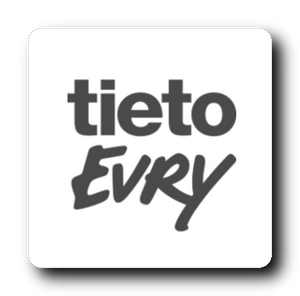 GSPP has three paper machines and three corrugated carton plants. The modernization of operations increases company's overall efficiency, especially production planning between the paper machines to reduce waste. Digitalization and automation also increase the company’s competitiveness in the growing Southeast Asia market e.g. by enabling more accurate demand forecast.
GSPP has three paper machines and three corrugated carton plants. The modernization of operations increases company's overall efficiency, especially production planning between the paper machines to reduce waste. Digitalization and automation also increase the company’s competitiveness in the growing Southeast Asia market e.g. by enabling more accurate demand forecast.
“Digitalization is an on-going process in GSPP, but the knowledge of how to integrate new technology into our existing systems to improve company efficiency is a big ask. The solution from TietoEVRY not only answers this question, it also lays the foundation for GSPP digitalization initiatives for the future,” says Yeoh, Kheng Leong, Senior Manager, IT, GSPP.
“We are proud to continue our long-term collaboration with Malaysian GSPP mill in their transformation journey. By selecting TIPS, the company can enhance their overall business performance and deliver improved customer service. The business renewal also offers GSPP a competitive edge and the added benefit of improved sustainability,” says Carsten Henke, Head of Pulp, paper and fibre at TietoEVRY.
TietoEVRY creates digital advantage for businesses and society. We are a leading digital services and software company with local presence and global capabilities. Our Nordic values and heritage steer our success.
Headquartered in Finland, TietoEVRY employs around 24 000 experts globally. The company serves thousands of enterprise and public sector customers in more than 90 countries. TietoEVRY’s annual turnover is approximately EUR 3 billion and its shares are listed on the NASDAQ in Helsinki and Stockholm as well as on the Oslo Børs. www.tietoevry.com
GS Paperboard & Packaging Sdn Bhd (GSPP), a member of Oji group, has been a dominant player in the domestic containerboard segment and they are one of the largest integrated paper and packaging manufacturers in Malaysia, founded in 1992. www.gspp.com.my
The new Voith OnCare.pmPortal – Digital data and inventory management for maximum transparency and availability
The data and inventory management of products and consumables involves a considerable amount of administrative work. The new digital asset management tool OnCare.pmPortal now offers paper manufacturers an optimum alternative for increasing both the transparency of product data and the efficiency of the procurement system, while also facilitating the planning of maintenance periods and downtimes and increasing plant availability. Thanks to a direct connection to the Voith Paper Webshop, registered components can be reordered quickly, easily and without any risk of confusion.
- Maximum transparency of product data, run times and inventories
- Optimally planned maintenance periods and downtimes
- Rapid reordering of registered components via the Voith Paper Webshop
“With the OnCare.pmPortal, Voith has developed a powerful asset management tool that simplifies central data management and gives paper manufacturers an overview of key products and consumables in their paper machine,” says Richard Birkhold, Global Product Manager Asset Management at Voith. “This facilitates optimized documentation of activities such as maintenance, repair and replacement, and simplifies data maintenance.” A particularly convenient feature of this tool is that it allows employees to select the component they are looking for using a digital image of the paper machine and provides them with immediate access to all relevant product information.
“Every day, I coordinate maintenance measures and control numerous processes,” says Karl-Josef Uhlemann, maintenance manager for rolls at Schoellershammer in Germany. “With the digital inventory management tool, I can now manage consumables and rolls centrally and access the data at any time and from any place.”
The OnCare.pmPortal now starts with two modules: The automated data recording of rolls and fabrics, as well as the digital inventory management of doctor blades. These product groups are automatically identifiable in the OnCare.pmPortal by means of a digital nameplate and do not require manual entry in the system.
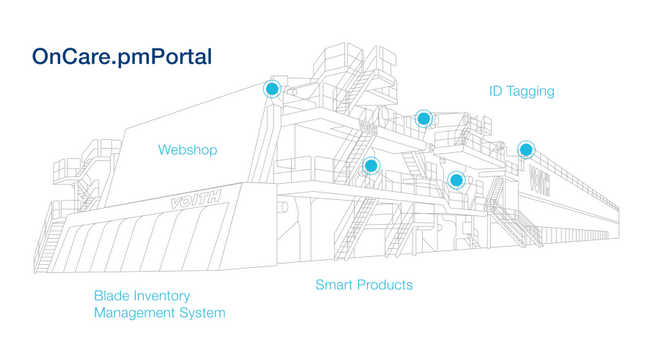
ID tagging for rolls and fabrics: For constant visibility of product data and run times
The ID tagging module for rolls and fabrics is a combination of contactless, radio-based connection technologies and the integration of digital nameplates based on proven industry standards. The solution offers simple, user-friendly tagging of rolls and fabrics and enables seamless identification through the scan of a digital nameplate. Regardless of the technology standard, the ID tags can be read with a smartphone and the corresponding Voith app and managed in the OnCare.pmPortal. The mobile application grants access to all product data, at any time and from any location, for efficient tracking of the product history and optimized documentation of activities such as maintenance, repair and replacement.
Karl-Josef Uhlemann explains: “Thanks to the combination of OnCare.pmPortal and the ID tagging module, I can identify a product directly via the digital nameplate or search the database. The mobile application with its intuitive interface provides a quick and easy overview of product information and important product lifecycle data.”
Blade Inventory Management System: Digital control of inventory data and fully automated management of inventories
With the help of the Blade Inventory Management System module, the operator no longer has to worry about ordering doctor blades or the associated stock control and supply chains. This is made possible with an ID tag on the packaging of the doctor blades. New doctor blades are automatically reordered and delivered by the system as soon as the stock in the warehouse reaches a minimum, individually defined level. As soon as the new blades arrive in the customer warehouse or existing blades are removed from the warehouse, the stock is updated in the OnCare.pmPortal and can be accessed from there at any time, thus increasing inventory traceability and transparency. At the same time, there is no need to maintain inventory lists or carry out inventory controls. As a result, the OnCare.pmPortal not only reduces the outlay and costs associated with inventory management, but also increases its efficiency by using automated and digitized processes.
Voith plans to extend ID tagging to additional consumables and components in the near future and, in doing so, will offer paper manufacturers an even more powerful tool.
Further information on the OnCare.pmPortal and available modules can be found at: www.voith.com/oncarepmportal
About the Voith Group
The Voith Group is a global technology company. With its broad portfolio of systems, products, services and digital applications, Voith sets standards in the markets of energy, oil & gas, paper, raw materials and transport & automotive. Founded in 1867, the company today has more than 20,000 employees, sales of € 4.2 billion and locations in over 60 countries worldwide and is thus one of the larger family-owned companies in Europe.
The Group Division Voith Paper is part of the Voith Group. As the full-line supplier to the paper industry, it provides the largest range of technologies, services and products on the market and offers paper manufacturers holistic solutions from a single source. The company’s continuous stream of innovations facilitates resource-conserving production and helps customers minimize their carbon footprint. With its leading automation products and digitalization solutions from the Papermaking 4.0 portfolio, Voith offers its customers state-of-the-art digital technologies to improve plant availability and efficiency for all sections of the production process.
Mondi launches AegisPaper, a complete range of recyclable barrier papers for sustainable packaging solutions
Mondi, a global leader in packaging and paper, has successfully developed a new recyclable functional barrier paper range. Designed with protection in mind, this range of certified recyclable barrier paper solutions is fully integrated across Mondi’s value chain—from paper production to the barrier application—and can run on existing filling lines for form-fill-and-seal (FFS) applications.
Mondi’s AegisPaper range reduces the amount of plastic used by replacing it with a renewable resource that has specific mechanical properties, such as puncture resistance, flexibility, printability and barrier protection. The coatings technologies applied to these papers create custom barriers against grease and water vapour and ensure sealability. AegisPapers are suitable for numerous packaging applications within the dry food, frozen food, pet food, confectionery, secondary packaging, toy, e-commerce, flower packaging, and DIY industries.
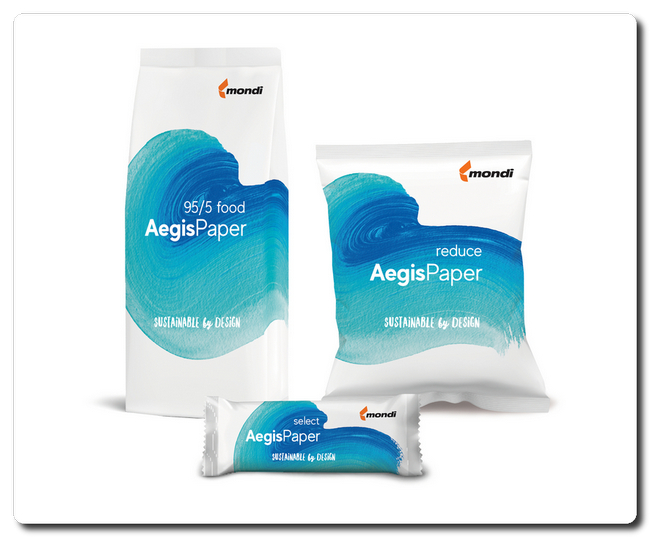
The functional barrier paper can replace plastic packaging that has traditionally been used for FMCG and consumer products. In a first step, Mondi’s collaboration with a European dry pasta producer will reduce the plastic used by 90% and save them 7,5 tonnes of plastic film per year for one of their product ranges. This pasta packaging and other commercialised solutions will be entering the market in the first half of 2021.
“Sustainability is at the centre of our strategy and I am pleased that this continues to be a focus for our customers. Thanks to combining Mondi’s know-how of paper making, coating, printing, converting, pouch and bag making alongside our expertise in selected end-uses for consumers, we make ‘paper where possible, plastic when useful,’ a reality. This launch is a breakthrough for the next generation of sustainable packaging.” said Peter Orisich, CEO, Flexible Packaging and Engineered Materials, Mondi.
Within AegisPaper, there are three grades available for different applications and requirements:
- AegisPaper select offers a wide range of custom barrier properties
- AegisPaper 95/5 food is certified as fully recyclable and has the best mechanical properties for food applications
- AegisPaper reduce provides the thinnest functional barrier paper to reduce amount of packaging material needed
The paper and coatings are all produced and applied in Europe.
Read more about Mondi’s range of recyclable barrier papers, AegisPaper, here: www.mondigroup.com/aegispaper
FreeForm Packaging AB launches a one-sided laminate based on 85% paper
FreeForm Packaging is launching a new, stretchable, paper laminate based on 85% paper. The new laminate is considered to be “one-sided”, which has been highly requested by many brand owners and retailers. Called Standard Paper Out, it does not have the traditional polythene layer on the outside – instead, it has paper. This gives any FreeFormPack® a natural, warm feel.
FreeForm Packaging produces and sells the world’s first truly formable paper packaging solution, based on stretchable and printable paper-based laminates that you can shape, twist and emboss, along with the unique machines that produce FreeFormPack®. Up until now, FreeForm Packaging has only been able to offer laminates with polythene on both sides to ensure good sealing properties, but this has now changed. A new process enables the packages to be fully sealed and makes it possible to shape them as required. The new laminate still offers good WVTR values, although it is less effective than a double-sided laminate.

“This is like a dream come true,” says Danevert Åsbrink, CEO of FreeForm Packaging AB. The new laminate allows the FreeFormPack system to produce formable paper packaging that is pleasant to the touch, which customers have been wanting for a very long time. “We have been working hard on this for the last six years, so it feels almost unreal to have finally reached our goal,” adds Danevert.
The FreeFormPack Standard Paper Out laminate has two layers of FibreForm®, and one of its two sides has a thin layer of polyethylene that protects the contents while also protecting the packaging. Considering the increased focus in society on recyclability, the emergence of the new laminate has been perfectly timed.
FreeForm Packaging AB is a Swedish company owned by CURTI (Italy) and BillerudKorsnäs AB (Sweden). With the FreeFormPack® Machine by CURTI and the FreeFormPack® Laminate, based on FibreForm® from BillerudKorsnäs in Sweden, the company offers customers more environmentally sound packaging compared to plastic.
Metsä Board starts a development programme for its Kemi paperboard mill
Metsä Board launches a development programme for its white-top kraftliner mill in Kemi, enabled by Metsä Fibre's new bioproduct mill investment announced today. The development programme is a significant step towards the company's sustainability targets for 2030. Metsä Board and Metsä Fibre are parts of Metsä Group. Metsä Board owns 24.9 per cent of its associated company Metsä Fibre.
The development programme will increase the mill's annual paperboard capacity by approximately 40,000 tonnes. The programme includes a series of modernisation and bottleneck investments in the paperboard production line, and as part of the programme, Metsä Board will purchase the modernised unbleached pulp production line with an annual capacity of approximately 180,000 tonnes from Metsä Fibre in 2023. The total investment value of the programme is approximately EUR 67 million, divided in 2021–2023, and mainly in 2023.
 The development programme will reduce the Kemi paperboard mill’s water consumption by about 40 per cent and energy consumption by about 5 per cent per tonne of paperboard produced. Metsä Board's company-level target is to reduce water consumption by 30 percent and energy consumption by 10 percent per tonne of paperboard produced by 2030 compared to 2018.
The development programme will reduce the Kemi paperboard mill’s water consumption by about 40 per cent and energy consumption by about 5 per cent per tonne of paperboard produced. Metsä Board's company-level target is to reduce water consumption by 30 percent and energy consumption by 10 percent per tonne of paperboard produced by 2030 compared to 2018.
Metsä Board’s annual net surplus in pulp will increase by approximately 325,000 tonnes in 2023, consisting of Metsä Board's 24.9 per cent share of Metsä Fibre's new bioproduct mill’s capacity increase, the transfer of the unbleached pulp production line to Metsä Board's direct ownership and the impact of the increased paperboard capacity on pulp consumption.
Financing for Metsä Fibre's bioproduct mill consists of funds generated from operations and debt. Metsä Board does not invest equity in Metsä Fibre to finance the project. Metsä Fibre will record an impairment loss impacting the result in the first quarter of 2021 related to the old pulp mill in Kemi. The impact on Metsä Board’s share of Metsä Fibre’s result is estimated to be approximately EUR -8 million and it will be classified as an item affecting comparability.
“Demand for premium and recyclable white-top kraftliners is growing rapidly in our main markets in North America and Europe. After these investments, Metsä Board's leading position in coated white kraftliners globally will be further strengthened, and Metsä Fibre's new bioproduct mill together with Metsä Board's paperboard mill will form a world class integrate in Kemi, Finland. The investment will significantly reduce water and energy consumption at the Kemi paperboard mill, and bring us closer to our ambitious sustainability targets, which we have set for year 2030. This also supports our customers' sustainable business,” says Mika Joukio, CEO of Metsä Board.
Metsä Board
Metsä Board is a leading European producer of premium fresh fibre paperboards and forerunner in sustainability. We produce premium lightweight folding boxboards, food service boards and white kraftliners for consumer goods packaging as well as retail-ready and food service applications. We work together with our customers on a global scale to innovate solutions for better consumer experiences with less environmental impact. The pure fresh fibres Metsä Board uses are a renewable resource, traceable to origin in sustainably managed northern forests. We aim for completely fossil free mills and raw materials by 2030.
The global sales network of Metsä Board supports customers worldwide, including brand owners, retailers, converters and merchants. In 2019, the company’s sales totalled EUR 1.9 billion, and it has approximately 2,400 employees. Metsä Board, part of Metsä Group, is listed on the Nasdaq Helsinki.
Metsä Group
Metsä Group is a forerunner in sustainable bioeconomy utilising renewable wood from sustainably managed northern forests. Metsä Group focuses on wood supply and forest services, wood products, pulp, fresh fibre paperboards and tissue and greaseproof papers.
In 2019, Metsä Group’s sales totalled EUR 5.5 billion, and it employs approximately 9,300 people. Metsäliitto Cooperative is the parent company of Metsä Group and is owned by approximately 100,000 Finnish forest owners.
A.Celli X-Roll: how to reduce the consumption of a Tissue machine with a single press nip configuration
The demands of the Tissue industry
Tissue paper producers all over the world are constantly looking for solutions that allow them to offer high quality products without possibly increasing production costs, among which those linked to energy consumption certainly stand out. In fact, as highlighted in the previous article about water management in a Tissue plant, we recall that the final evaporation eliminates a relatively small part of the total water present in the fibers, but involves a considerable waste of thermal energy supplied by steam boilers (for the operation of the Yankee Dryer) and by an aerothermal system.
With this in mind, a series of studies conducted on pilot lines led to the conclusion that the key to obtaining the best results in terms of bulk without negatively affecting consumption could be represented not so much by the pressing phase that takes place in the nip between the suction press roll and the Yankee Dryer, but from the previous pre-drying phase carried out by means of the suction sector of the press roll itself located immediately before the nip.
The results of the studies described above show, in fact, that a significant impact on the output of the production process is due to the degree of dryness of the felt and, therefore, by the ability of the latter to absorb water from the Tissue paper. Starting from this, A.Celli has developed a solution to optimize the configuration with a single press nip in order to obtain Tissue paper of equal quality and, at the same time, a reduction in energy consumption associated with the drying area.
Conventional configuration with a single press nip
Let's analyze the operation of a conventional Tissue machine with a single press:
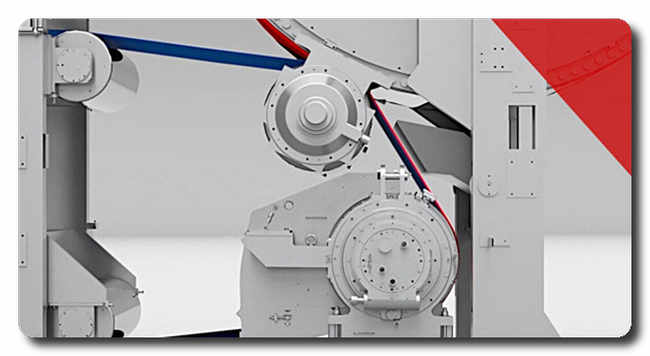
In this case, the pressing that takes place in the nip formed by the suction press roll and the Yankee Dryer will be contextual to the action of the vacuum sector inside the suction press roll itself. The latter consists of a perforated cylinder equipped with a metal shell and covered in synthetic material, and the holes have the task of retaining the water drained by the pressing action. Inside the shell there is a suction box whose task is to create a depression inside the press itself by connecting to a vacuum pump, thus sucking the air present in the holes in order to allow the water to be housed inside them. This water will then be extracted by centrifugation as soon as the effect of the vacuum itself disappears..
In this configuration it is also possible to use a steam box, positioned in correspondence with the suction press roll and just before the nip, whose purpose is to increase the water temperature and therefore decrease its viscosity. In this way, during the pressing phase the water is able to flow better into the felt and into the holes of the suction press roll.
However, the positioning of the steam box is not optimized from the point of view of efficiency as it acts in a point where the Tissue paper still has a high amount of water. In addition to this, the case thus positioned is subject to clogging due to the fiber fragments expelled by centrifugal force from the felt during the passage on the suction press roll. The consequence is that these fragments, once the steam box is activated, will be thrown at high speed against the Tissue paper, causing breakages.
A.Celli X-Roll
As we have said, A.Celli X-Roll's goal is to combine the quality of Tissue paper obtainable using the traditional configuration with a lower total energy consumption.
To achieve this result, the goal was to ensure a high degree of dryness of the felt before the pressing phase, so as to reduce the power to be supplied in the drying section during the subsequent evaporation phase. While the conventional configuration first envisages the combined action of the steam box and the vacuum followed by the action exerted by the nip, A.Celli X-Roll uses in succession a suction roll, a steam box and a blind press:
- In the first place we will have the action of vacuum by means of the suction roll. By doing so, a part of water will be eliminated, thus increasing the degree of dryness of the felt before the next two phases.
Successful start-up of Papel Aralar’s PM 5 for sustainable wet wipes
Voith and the nonwoven fabric expert Truetzschler Nonwovens have delivered a new system for specialty paper production to the Spanish paper factory Papel Aralar. In December, the PM 5 successfully started up and is now stably producing adult and baby wet wipes that are completely plastic-free, flushable and biodegradable, a characteristic that conventional wet wipes do not have. With the recent investment, Aralar now has two WLS lines with a total production capacity of 45,000 tons/year.
- Production of plastic-free, flushable and sustainable wet wipes
- Technological highlights are Voith’s HydroFormer and Truetzschler’s AquaJet for high-performance Wet-Laid Spunlacing (WLS)
“The successful start-up of PM 5 is an important step forward in our company’s sustainability strategy,” says Senén Amunarriz, CEO of Papel Aralar. “And it is Voith’s innovative papermaking solutions and know-how that are contributing to this success. Our decision to invest in this state-of-the-art new production line was driven by the forecast growth in demand for biodegradable substrates for wet wipe production.”
“We are happy and proud to partner with Papel Aralar and to provide them, together with Truetzschler, with our efficient and sustainable papermaking technologies,” says Marcos Garcia de la Torre, Managing Director Voith Paper Spain. “Thanks to the Aralar-Truetzschler-Voith team and the close collaboration we were able to carry out a smooth and timely start-up.”
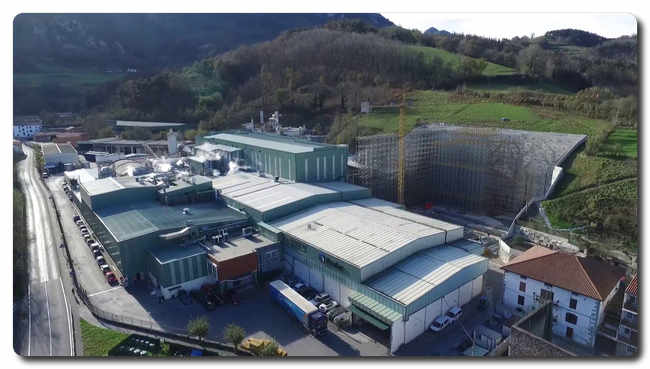
HydroFormer and AquaJet for high-performance Wet-Laid Spunlacing
As a full-line supplier, Voith supplied the BlueLine stock preparation, the main components of the XcelLine paper machine and a comprehensive automation and control package from one single source. The HydroFormer, which is one of the main components of the new system, draws on Voith’s extensive experience in the papermaking and pulp industries. With this technology, the suspension is heavily diluted to produce nonwoven materials made completely of cellulose, a renewable resource. Besides the HydroFormer, Voith has supplied the BlueLine stock preparation, a master reel, and the approach flow system for the new line.
Truetzschler Nonwovens completed the production line with the well-proven AquaJet in an innovative configuration for hydroentangling (spunlacing) and an energy-efficient multi-drum dryer. The many years of expertise and experience of the Truetzschler company form the basis of the web bonding and drying components that have been adapted to the needs of the wet-laid process.
About Truetzschler
With about 3,000 employees, Truetzschler is one of the leading textile machine manufacturers in the world. Truetzschler specializes in machines, systems, and accessories for spinning preparation, nonwovens, and the chemical fiber industry. Founded more than 125 years ago, the company is headquartered in Moenchengladbach, Germany. It has additional locations in Germany, India, China, Brazil, the USA, and Switzerland.
Truetzschler Nonwovens is a division of the Truetzschler Group with a focus on complete production lines and machinery for hydroentangled (spunlaced), through-air and chemical bonded nonwovens. Its range of products includes solutions encompassing the entire nonwovens process chain from fiber preparation, web formation, web bonding, and finishing to drying and winding.
About the Voith Group
The Voith Group is a global technology company. With its broad portfolio of systems, products, services and digital applications, Voith sets standards in the markets of energy, oil & gas, paper, raw materials and transport & automotive. Founded in 1867, the company today has more than 20,000 employees, sales of € 4.2 billion and locations in over 60 countries worldwide and is thus one of the larger family-owned companies in Europe.
The Group Division Voith Paper is part of the Voith Group. As the full-line supplier to the paper industry, it provides the largest range of technologies, services and products on the market and offers paper manufacturers holistic solutions from a single source. The company’s continuous stream of innovations facilitates resource-conserving production and helps customers minimize their carbon footprint. With its leading automation products and digitalization solutions from the Papermaking 4.0 portfolio, Voith offers its customers state-of-the-art digital technologies to improve plant availability and efficiency for all sections of the production process.
New cross-range colour matching tool from Arjowiggins
Arjowiggins has launched an innovative new colour matching tool to make it simple for designers and brands to combine products from two of its complementary creative paper collections - Keaykolour and Curious Metallics.
With this new tool Arjowiggins demonstrates its command of colour creation, development and matching and reaffirms its position as the ‘International standard for colour’ in creative papers.
The new tool, designed by creative partner North, comes as a dual box set and highlights perfect colour matches, complementary colour families and the opportunities for creative combinations within the different range finishes.
The box set comprises a Keaykolour box and a Curious Metallics box, each holding a set of specially-designed loose sample cards which showcase each range in its entirety. A choice of ten box colours are available for each range. A clever die-cut design enables customers to change the top sheet to view different colour combinations, and each box in the set can also be used individually.
A selection of ten pairs of sample cards across the two ranges are printed with identical graphic designs using a variety of print techniques including embossing, foiling and offset. They showcase colour matches such as Metallics’ Electric Blue with Keaykolour’s Royal Blue, Metallics’ Magma with Keaykolour’s Chili Pepper and Metallics’ Ice Silver with Keaykolour’s Pure White.
The practical A6 size, coupled with the loose-card and die-cut format of the box sets, allows customers to explore and discover other unique colour harmonies and pairs, underlining the strength of the two palettes and Arjowiggins’ commitment to widening creative possibilities for its customers.

Jose-Anne d’Auvergne, Head of Marketing at Arjowiggins, comments: “We are constantly listening and looking to respond to the needs of our customers. To this end we have created this very practical and interactive alternative to the traditional sample book. Colour remains one of the key attributes of any creative paper and is very often the first criterion in the selection of paper for graphic printing or design. Our Keaykolour and Curious Metallics ranges exist beautifully on their own but have been carefully crafted to work harmoniously together.
“This new tool will enable customers to approach our paper ranges in a new way. The loose card format encourages customers to play with papers and colour; finding new and unexpected combinations that they may not have imagined with a traditional bound book. The new tool also uses less paper, making it a more sustainable option.”
Keaykolour is a collection of natural, wove textured, high-rigidity papers and boards in 48 sophisticated mid-tone colours, arranged in nine chromatically harmonised colour families. It also includes a choice of 100% recycled products as well as a range of 13 embossing patterns. The Curious Metallics collection brings a shimmering lustre to eight coherent families of muted and natural tints, along with a small number of resonant, contemporary colours, across a wide array of papers and boards.
The 48 colours of Keaykolour coupled with the 30 colours of Curious Metallics create a harmonious palette that reveals the power of creative combinations between the refined, natural texture of Keaykolour and the ever-so-subtle shimmer of Curious Metallics.
The new colour matching tool is available through Arjowiggins’ network of merchants and is available either as a set of two boxes or as two individual boxes.
Customers are being invited to share their favourite colour combinations on Arjowggins’ social platforms @arjocreatives on Instagram and @arjopapers on Twitter using the hashtag #myarjomixandmatch.
Arjowiggins is one of the world’s leading manufacturers of creative papers with over 320 years of expertise in papermaking and a mission to continually set international standards.
For further information, visit www.arjowigginscreativepapers.com
About Arjowiggins
International standards for creative and technical papers – since the 17th century.
Arjowiggins is an independent paper manufacturer with a rich history reaching back to the 17th century. From its Anglo-French roots, Arjowiggins has grown into a paper manufacturer with a global reach, marrying experience, knowledge and skill to Arjowiggins’ portfolio of products includes:
- Creative papers, Creative packaging & Labels
- Bookbinding & Covering papers
- Translucent papers, including barrier papers
- Smart papers
- Security papers
- Transfer papers
The company continues to produce all of the iconic products that have built its reputation, including Conqueror, Curious Collection, Keaykolour, Pop’Set, Rives, Delos, Geltex, Gateway, Jetguard, Laserguard, and more recently Powercoat for printed electronics. Our papers are manufactured across four mills, in Europe (Stoneywood and Chartham in the UK, Guarro Casas in Spain) and China (Quzhou).
Arjowiggins’ creative papers offer an extensive array of weights, colours and finishes and are chosen the world over in the creation pf printed communication of all kinds from stationery to annual reports, books and luxury packaging. Arjowiggins’ mission has always been to help designers, printers, advertisers and brand owners to channel the unique qualities of print and provide them with the finest papers, wherever they may be.
Sustainability and respect for the environment remain more than ever at the heart of Arjowiggins’ activities, through a wide range of ongoing internal and external initiatives. The paper manufacturer retains an intense focus on maintaining its position as a pioneer in the development of innovative, high added-value creative and technical paper products.
Arjowiggins’ papers are distributed worldwide.
Valmet to supply steam profiler and condition monitoring solution and services to Zhejiang Jingxing Paper Co., Ltd. in China
Valmet will supply Valmet IQ Steam Profiler and Valmet DNA Machine Monitoring systems with condition monitoring analysis and diagnosis services to Zhejiang Jingxing Paper Co., Ltd. in China. The systems will be installed on Jingxing Paper’s paper machines PM12 and PM16 to provide effective moisture profile management and predictive condition monitoring, and to improve production runnability and end-product quality.
The order was included in Valmet's orders received of the fourth quarter 2020. The delivery will take place in the first quarter of 2021.
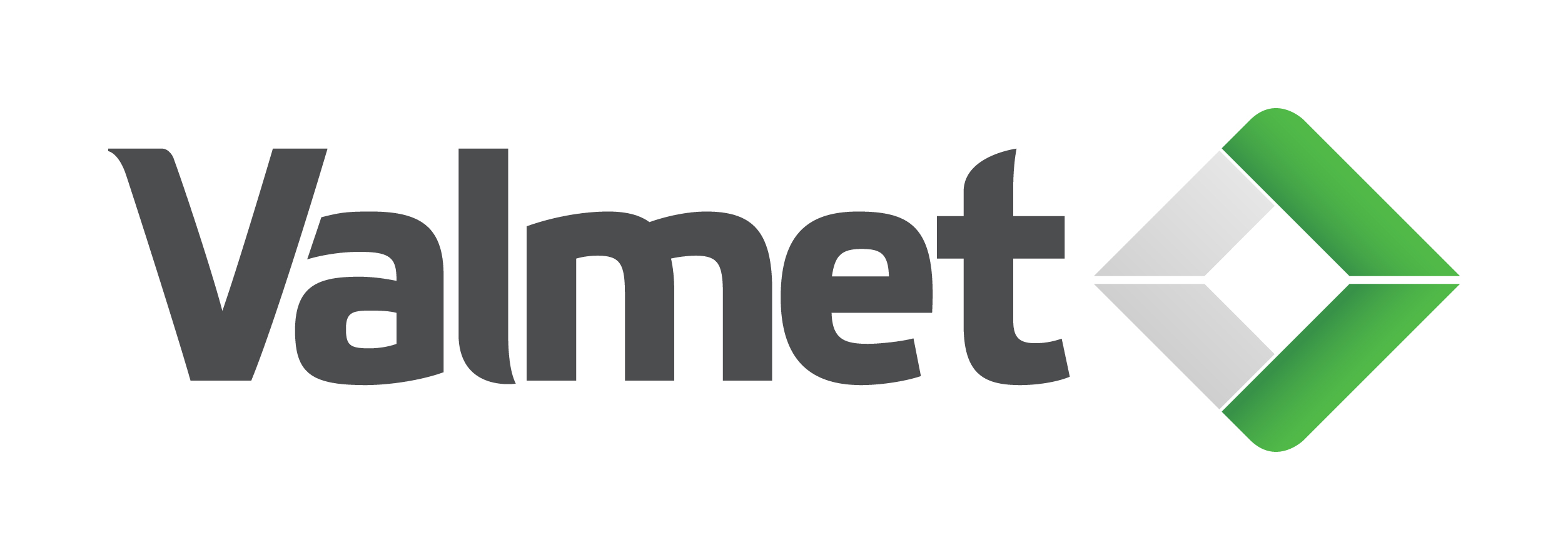 “Valmet is one of our strategic partners, and we have had good cooperation with them. We believe that Valmet’s automation solutions and innovative technology will help us improve production reliability and better product quality,” says Xiaodong Qian, General Manager, Industrial paper department, Jingxing Paper.
“Valmet is one of our strategic partners, and we have had good cooperation with them. We believe that Valmet’s automation solutions and innovative technology will help us improve production reliability and better product quality,” says Xiaodong Qian, General Manager, Industrial paper department, Jingxing Paper.
“We are happy that Jingxing Paper has chosen our solutions to improve their plant productivity and performance. Valmet DNA Machine Monitoring system and our new user interface will provide adequate machine information and enable vibration analysis and diagnosis service via Valmet Industrial Internet remote connection,” says Liang Zhou, Sales Manager, China, Automation, Valmet.
Information about Valmet's delivery
The Valmet IQ Steam Profiler is a multi-zone steambox system that provides unique profiling accuracy through its electromechanical actuator with position feedback. It features advanced steam injection technology that maximizes steam absorption efficiency and temperature increase to provide increased dryness after the press.
Valmet condition monitoring solutions produce real-time machine health information for effective planning and scheduling of maintenance operations.
Information about the customer Zhejiang Jingxing Paper Co., Ltd.
Founded in 1984, Jingxing Paper is one of the largest industrial papermaking enterprises and kraft paperboard manufacturers in China. The company is listed on Shenzhen Stock Exchange. The company has annual capacity of 1,500,000 tons of paper, main grades are kraft paper, white craft paper, high strength corrugating medium, cardboard boxes and household paper products.
Valmet is the leading global developer and supplier of process technologies, automation and services for the pulp, paper and energy industries. We aim to become the global champion in serving our customers.
Valmet's strong technology offering includes pulp mills, tissue, board and paper production lines, as well as power plants for bioenergy production. Our advanced services and automation solutions improve the reliability and performance of our customers' processes and enhance the effective utilization of raw materials and energy.
Valmet's net sales in 2020 were approximately EUR 3.7 billion. Our 14,000 professionals around the world work close to our customers and are committed to moving our customers' performance forward - every day. Valmet's head office is in Espoo, Finland and its shares are listed on the Nasdaq Helsinki.
Read more www.valmet.com
Valmet and Anhui Shanying in China extend the unique roll service and condition monitoring agreement for a further three years
Valmet and Shanying International Holdings Co., Ltd., have signed an agreement for an additional three years of Valmet’s roll maintenance and condition monitoring services at the company's Anhui mill in China.
The services cover roll grinding, recovering and reconditioning, roll condition monitoring and vibration analysis for five board machines together with on-site investigation and Valmet Industrial Internet remote analysis and diagnosis by Valmet’s roll experts.
 Roll condition monitoring with Valmet DNA Machine Monitoring systems has been operating at the site since 2017 when the first roll maintenance and condition monitoring service agreement started. As a result of the original agreement and long-term collaboration with Valmet, the mill has seen increased roll lifetimes with significant reductions in unplanned downtime and roll regrinding.
Roll condition monitoring with Valmet DNA Machine Monitoring systems has been operating at the site since 2017 when the first roll maintenance and condition monitoring service agreement started. As a result of the original agreement and long-term collaboration with Valmet, the mill has seen increased roll lifetimes with significant reductions in unplanned downtime and roll regrinding.
“The extensive mill personnel training for Valmet DNA Machine Monitoring supported by our vibration experts via a secure data connection makes full use of the mill’s roll condition monitoring systems. The extended service agreement will continue to ensure the level of equipment maintenance and management is at the forefront of the industry. It also demonstrates the value of the service agreement through achieving mutually set targets,” says Shiming Xu, Service Director, China, Automation, Valmet.
Technical information about Valmet DNA Machine Monitoring and Valmet Industrial Internet remote analysis and diagnosis by Valmet roll experts
Valmet DNA Machine Monitoring offers machine and roll condition information for process operators and maintenance personnel through one common user interface. Operators are immediately alerted if there is a risk of machine/roll failure and indicators of roll condition, while the paper machines are running, are easily analyzed.
A secure Valmet Industrial Internet remote connection allows Valmet experts to provide an agreed level of remote diagnostic support for machine problems and roll maintenance decisions. The preventive maintenance aspect of Valmet’s roll service is greatly enhanced with continuous condition monitoring to extend roll lifetime, optimize maintenance intervals and identify roll or felt issues.
Information about the customer Shanying International Holdings Co., Ltd.
Headquartered in Shanghai, Shanying International Holdings Co., Ltd., is an international enterprise integrating the Industrial Internet platform, pulping, industrial and specialty paper manufacturing, and customized packaging products and services. The Anhui mill is located in Ma’anshan City, and the company has several packaging paper and newspaper production lines producing box board paper, high-strength fluting paper, card paper, newspaper and other products.
Valmet is the leading global developer and supplier of process technologies, automation and services for the pulp, paper and energy industries. We aim to become the global champion in serving our customers.
Valmet's strong technology offering includes pulp mills, tissue, board and paper production lines, as well as power plants for bioenergy production. Our advanced services and automation solutions improve the reliability and performance of our customers' processes and enhance the effective utilization of raw materials and energy.
Valmet's net sales in 2019 were approximately EUR 3.5 billion. Our 14,000 professionals around the world work close to our customers and are committed to moving our customers' performance forward - every day. Valmet's head office is in Espoo, Finland and its shares are listed on the Nasdaq Helsinki.
Read more www.valmet.com
